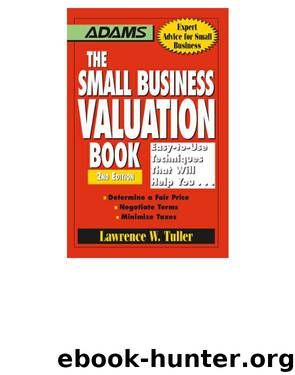The Small Business Valuation Book by Lawrence W Tuller

Author:Lawrence W Tuller
Language: eng
Format: mobi
Tags: Ebook, epub
Publisher: F+W Media, Inc.
Published: 0101-01-01T00:00:00+00:00
PART II
VALUATIONS FOR SPECIAL SITUATIONS
10
Minority Interests
Experience has shown that more disputes arise over the value of small business minority interests than over practically any other matter. The value of an entire business for IRS purposes is based on the tax code, revenue rulings, and tax court precedents. The value of an entire business in a merger, acquisition, or disposition begins with the calculated present value of a future stream of benefits and ends with a negotiated price. Determining the value of a minority interest is a different matter entirely. The reason is simple: A minority shareholder has no control over the board of directors, operating policies, or the distribution of earnings. A shareholder with a 49 percent interest in a company is in as weak a position as one with 1 percent.
This tends to be a hard pill for small business owners to swallow, especially when strategic plans call for bringing in one or more partners. The common assumption is that a 49 percent interest is worth 49 percent of the total company's value. But this is totally at variance with the benefits arising from minority versus majority control.
For example, small business owner Smith decides to plan for retirement in ten years by selling 49 percent of the outstanding shares to a partner, who will eventually buy the entire business. Smith goes through a traditional business valuation, multiplies the total company value by 49 percent, and offers that as a price to the new partner. Smith argues that if the new partner, Jones, is to receive 49 percent of the earnings of the business, the purchase price should be 49 percent of the company's value. Jones flatly refuses on the basis that Smith retains absolute control and could back out of the promised distribution, leaving Jones with nothing.
Smith sweetens the pot, agreeing to write a partnership contract stipulating that Jones will receive a distribution of 49 percent of the cash earnings each year and Smith 51 percent. Still not good enough, argues Jones. What will prevent Smith from taking an outrageous salary or bonus or charging personal expenses to the company, thereby diminishing the cash available for distribution? And on and on it goes. It is virtually impossible to write a contract guaranteeing Jones a 49 percent cash distribution when Jones has no authority to determine the total available cash.
Or take another example that is equally problematical in partnership arrangements. Assume that Smith and Jones agree to equal ownership, but that Smith's wife wants 2 percent. In this case, a 2 percent owner has more control than either of the two 49 percent shares, because when disputes arise, Smith's wife can cast her vote one way or the other and therefore control the decision.
Or assume that Smith and Jones each own a 50 percent interest, thereby sharing control. With neither partner holding a controlling interest, who will arbitrate disagreements over policy decisions? Such disputes bring inaction, and inaction can ruin the business. If value is based on control, and it should be, then a 50-50 split severely diminishes the value of both parties' ownership interests.
Download
This site does not store any files on its server. We only index and link to content provided by other sites. Please contact the content providers to delete copyright contents if any and email us, we'll remove relevant links or contents immediately.
The Brazilian Economy since the Great Financial Crisis of 20072008 by Philip Arestis Carolina Troncoso Baltar & Daniela Magalhães Prates(133694)
International Integration of the Brazilian Economy by Elias C. Grivoyannis(108703)
The Art of Coaching by Elena Aguilar(53176)
Flexible Working by Dale Gemma;(23284)
How to Stop Living Paycheck to Paycheck by Avery Breyer(19686)
The Acquirer's Multiple: How the Billionaire Contrarians of Deep Value Beat the Market by Tobias Carlisle(12308)
Thinking, Fast and Slow by Kahneman Daniel(12226)
The Radium Girls by Kate Moore(12013)
The Art of Thinking Clearly by Rolf Dobelli(10417)
Hit Refresh by Satya Nadella(9120)
The Compound Effect by Darren Hardy(8922)
Tools of Titans by Timothy Ferriss(8362)
Atomic Habits: Tiny Changes, Remarkable Results by James Clear(8319)
Turbulence by E. J. Noyes(8040)
A Court of Wings and Ruin by Sarah J. Maas(7809)
Change Your Questions, Change Your Life by Marilee Adams(7734)
Nudge - Improving Decisions about Health, Wealth, and Happiness by Thaler Sunstein(7689)
How to Be a Bawse: A Guide to Conquering Life by Lilly Singh(7466)
Win Bigly by Scott Adams(7183)
